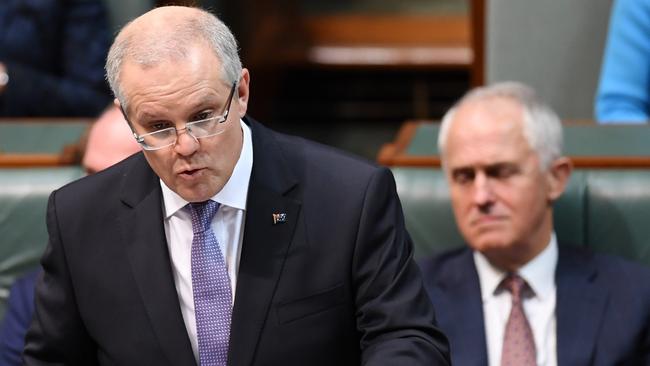Scomo’s bacon saving Budget
AUSTRALIANS accept we must live within our means, balancing government spending to invigorate the economy against savings to reduce debt.

Opinion
Don't miss out on the headlines from Opinion. Followed categories will be added to My News.
AUSTRALIANS accept we must live within our means, balancing government spending to invigorate the economy against savings to reduce debt.
In handing down the federal Budget on Tuesday, Treasurer Scott Morrison recommitted the Turnbull Government to achieving a Budget surplus by 2020-21 and to maintaining Australia’s triple A credit rating — both of which may or may not be realised.
But more than numbers, this is a Budget that pads up against Labor’s hot-button agenda, targeting health and education, housing affordability, foreign workers, the sanctity of Medicare, banking regulation reform and full funding for the National Disability Insurance Scheme.
Facing a real threat of defeat at the next election, which can be held as early as August 2018, the Coalition has sought to finally bury memory of the politically damaging $13 billion in slash savings set out in the 2014-15 Budgets and will establish the Medicare Guarantee Fund in the wake of last year’s Mediscare campaign.
Despite some big-scope rail and road projects, this is no nation-building, wide-vision Budget but a practical response to the government’s political realities, and is aimed squarely at middle Australia.
The problem is this Budget reads too much like it was ghost-written by Opposition Leader Bill Shorten. It’s Laboresque in its tax slug against banks and Medicare hikes, which will impact families without a single meaningful saving in the short term. And it will leave Mr Morrison and Prime Minister Malcolm Turnbull exposed to significant blowback from conservative elements within the Coalition. Tellingly, the Treasurer intervened on Tuesday to prevent his staff releasing modelling on the impact of Medicare levy rises, which will generate an extra $56 billion over 10 years to fund NDIS.
While Australia pays $1 billion a month in interest on borrowings and logs a forecast $29.4 billion deficit, the government cannot afford to ignore a spreadsheet that lumps coming generations with crippling debt. The Treasurer has set out moderate expenditures and continued some steps towards Budget repair, seeking to protect a credit rating that if downgraded risks adding another zero to the interest bill.
Australia has had 26 years of consecutive growth, a positive that nonetheless masks the challenges we have faced, in both technical avoidance of recession and significant sections of the community who haven’t directly benefited from the mining or property booms as wage growth stalled and costs of living rose.
In setting out a $75 billion national infrastructure spend over the next decade, noted in Victoria for $500 million for regional rail and $30 million to progress a Melbourne airport rail link, the Coalition has some concrete projects to crow about.
Booming populations in Australian capitals — which Melburnians know only too well — is exposing a failure by both state and federal governments to have cooperatively invested in roads and public transport. This Budget takes a step towards redressing a failure to future-proof that infrastructure, highlighted by an $8.4 billion equity investment for a Melbourne-to-Brisbane inland rail service.
But the Budget falls short of rebalancing the fair spend owed to Victoria. New South Wales and Queensland, potted with seats seen as vital for winning or retaining government, continue to receive inordinate levels of funding.
As expected, Victoria does get a boost to its asset recycling dividend after the Port of Melbourne lease, from $877 million to $1 billion, but still $450 million less than what was sought.
As well as the money for a potential airport rail line, the Victorian Government can bid for a slice of the $10 billion National Rail Program. Plenty of analysis has already been conducted on the Tullamarine rail link and Premier Daniel Andrews must prioritise a business case to get project funding through the new NRP.
Another potential windfall is Victoria’s ability to offload its stake in Snowy Mountains Hydro to the Commonwealth and reinvest in state infrastructure.
The Budget has also moved to open up new housing land, including at Maribyrnong, superannuation savings changes for first-home buyers and capital gains tax and vacant property penalties for foreign buyers.
The 2017-18 deficit is forecast to be slashed to $2.5 billion in 2019-20, before turning back to black in 2021 with a $7.4 billion surplus.
Of course, these projections are just numbers on a page and unless the government secures a stronger mandate at the next election, or indeed whether it is returned at all, any future surplus may not be met. Which is why this moderate-spending, easy-on-the-cuts Budget is framed to deliver few nasties, almost no surprises and banks on better international trade conditions — particularly in China and the US — to safeguard the Australian economy across the next several years.
Often, a government’s first post-election Budget is a hard-hitting document making the savings before a budgetary splurge to sweeten voters in the later election cycle.
That’s not the case with this Budget, which taxes and scattergun spends amid an uncertain economic outlook.
The tax reductions for 3.2 million businesses under the $10 million threshold are a solid cornerstone of the government’s strategy to bolster jobs growth and revitalise industry.
Continuing reforms in the $164.1 billion social security outlay are also vital to getting more people capable of working off welfare and directing funds to those in need.
Importantly, defence spending will increase to 2 per cent of GDP by 2020-21.
But at the end of the day, Scott Morrison’s Budget is more about saving the government’s bacon than bringing it home for Australians.


